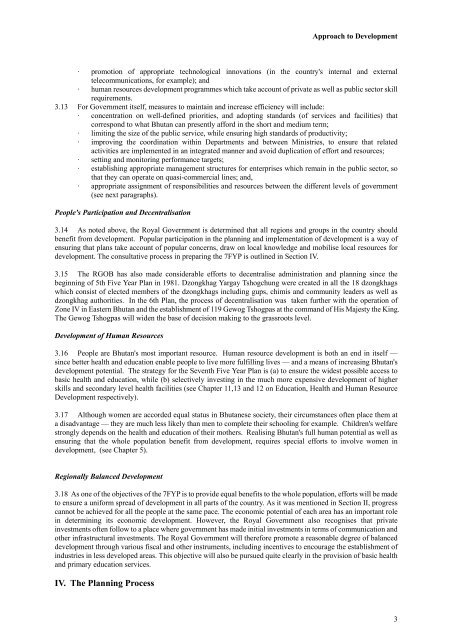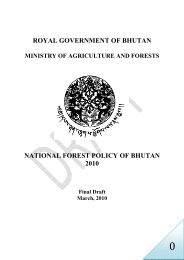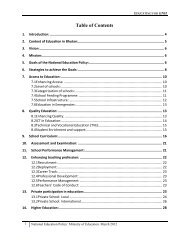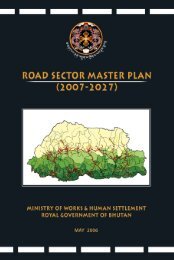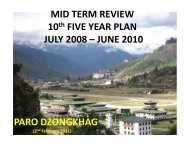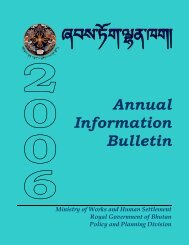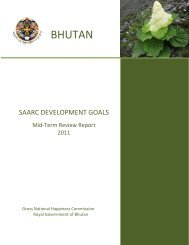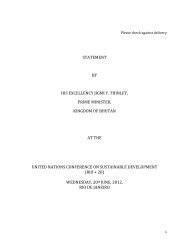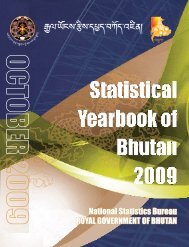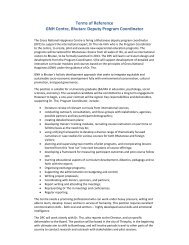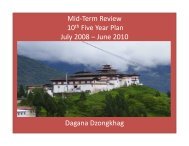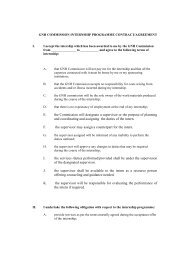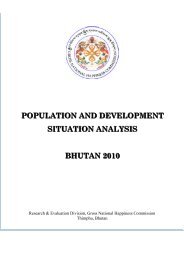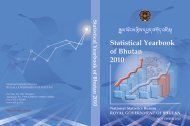COUNTRY BACKGROUND - Gross National Happiness Commission
COUNTRY BACKGROUND - Gross National Happiness Commission
COUNTRY BACKGROUND - Gross National Happiness Commission
Create successful ePaper yourself
Turn your PDF publications into a flip-book with our unique Google optimized e-Paper software.
Approach to Development<br />
· promotion of appropriate technological innovations (in the country's internal and external<br />
telecommunications, for example); and<br />
· human resources development programmes which take account of private as well as public sector skill<br />
requirements.<br />
3.13 For Government itself, measures to maintain and increase efficiency will include:<br />
· concentration on well-defined priorities, and adopting standards (of services and facilities) that<br />
correspond to what Bhutan can presently afford in the short and medium term;<br />
· limiting the size of the public service, while ensuring high standards of productivity;<br />
· improving the coordination within Departments and between Ministries, to ensure that related<br />
activities are implemented in an integrated manner and avoid duplication of effort and resources;<br />
· setting and monitoring performance targets;<br />
· establishing appropriate management structures for enterprises which remain in the public sector, so<br />
that they can operate on quasi-commercial lines; and,<br />
· appropriate assignment of responsibilities and resources between the different levels of government<br />
(see next paragraphs).<br />
People's Participation and Decentralisation<br />
3.14 As noted above, the Royal Government is determined that all regions and groups in the country should<br />
benefit from development. Popular participation in the planning and implementation of development is a way of<br />
ensuring that plans take account of popular concerns, draw on local knowledge and mobilise local resources for<br />
development. The consultative process in preparing the 7FYP is outlined in Section IV.<br />
3.15 The RGOB has also made considerable efforts to decentralise administration and planning since the<br />
beginning of 5th Five Year Plan in 1981. Dzongkhag Yargay Tshogchung were created in all the 18 dzongkhags<br />
which consist of elected members of the dzongkhags including gups, chimis and community leaders as well as<br />
dzongkhag authorities. In the 6th Plan, the process of decentralisation was taken further with the operation of<br />
Zone IV in Eastern Bhutan and the establishment of 119 Gewog Tshogpas at the command of His Majesty the King.<br />
The Gewog Tshogpas will widen the base of decision making to the grassroots level.<br />
Development of Human Resources<br />
3.16 People are Bhutan's most important resource. Human resource development is both an end in itself —<br />
since better health and education enable people to live more fulfilling lives — and a means of increasing Bhutan's<br />
development potential. The strategy for the Seventh Five Year Plan is (a) to ensure the widest possible access to<br />
basic health and education, while (b) selectively investing in the much more expensive development of higher<br />
skills and secondary level health facilities (see Chapter 11,13 and 12 on Education, Health and Human Resource<br />
Development respectively).<br />
3.17 Although women are accorded equal status in Bhutanese society, their circumstances often place them at<br />
a disadvantage — they are much less likely than men to complete their schooling for example. Children's welfare<br />
strongly depends on the health and education of their mothers. Realising Bhutan's full human potential as well as<br />
ensuring that the whole population benefit from development, requires special efforts to involve women in<br />
development, (see Chapter 5).<br />
Regionally Balanced Development<br />
3.18 As one of the objectives of the 7FYP is to provide equal benefits to the whole population, efforts will be made<br />
to ensure a uniform spread of development in all parts of the country. As it was mentioned in Section II, progress<br />
cannot be achieved for all the people at the same pace. The economic potential of each area has an important role<br />
in determining its economic development. However, the Royal Government also recognises that private<br />
investments often follow to a place where government has made initial investments in terms of communication and<br />
other infrastructural investments. The Royal Government will therefore promote a reasonable degree of balanced<br />
development through various fiscal and other instruments, including incentives to encourage the establishment of<br />
industries in less developed areas. This objective will also be pursued quite clearly in the provision of basic health<br />
and primary education services.<br />
IV. The Planning Process<br />
3


